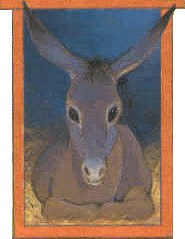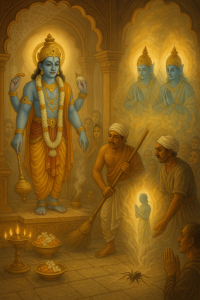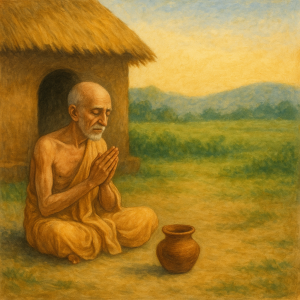A Temple Lamp Burning for the Lord
In a sacred temple dedicated to Lord Hari, an eternal flame was maintained on the altar. The lamp burned day and night, fueled by pure ghee offered with devotion by the temple brāhmaṇas. It was considered a special service—keeping the light burning at the Lord’s feet, signifying the presence of eternal knowledge and the fire of love.
Many devotees would bow before the lamp before offering prayers, understanding it to be a symbolic representation of the Lord’s mercy and illumination.
The Insect’s Unintentional Offering
One evening, just before sunset, as the priests completed their daily rituals, a small winged insect—attracted by the golden light—flew near the flame. Not realizing the danger, it circled the lamp again and again, mesmerized by its brilliance.
Suddenly, the insect fell into the ghee flame, and its body was instantly consumed. The priests, noticing the tiny creature’s demise, sighed softly and continued their worship. But in the invisible realm, a divine miracle had just taken place.
Liberation Through Contact with Sacred Flame
As soon as the insect’s body was consumed in the lamp offered to the Lord, Viṣṇudūtas descended. Their forms were radiant, their faces filled with compassion. They spoke among themselves:
“This soul, though in the form of an insect, has been offered into a lamp that was burning for the Lord. This is not an ordinary death—it is a form of āhuti, an offering. Because it perished in connection with the Lord’s worship, its sins have been burned, and its soul is now liberated.”
The soul of the insect was lifted up, and in a moment, it took on a divine, radiant form. Freed from its karmic bondage, it was carried to Vaikuṇṭha, the abode of eternal bliss and service.
Lessons to Be Learned:
- Even accidental contact with sacred objects connected to Lord Viṣṇu—such as a lamp offered in worship—can bring about liberation.
- The Lord accepts even unconscious offerings, if they are connected to His service.
- All beings are recipients of divine mercy, especially when they come in contact with devotional activities.
- As it is said in śāstra: “yajñārthāt karmaṇo’nyatra loko’yaṁ karma-bandhanaḥ”
“Work done as a sacrifice for Viṣṇu does not bind one to this world.” (Bhagavad-gītā 3.9)
Origin of the Story: Padma Purāṇa – Stories section illustrating how even an insect attains liberation by falling into a lamp offered in Viṣṇu’s service.


